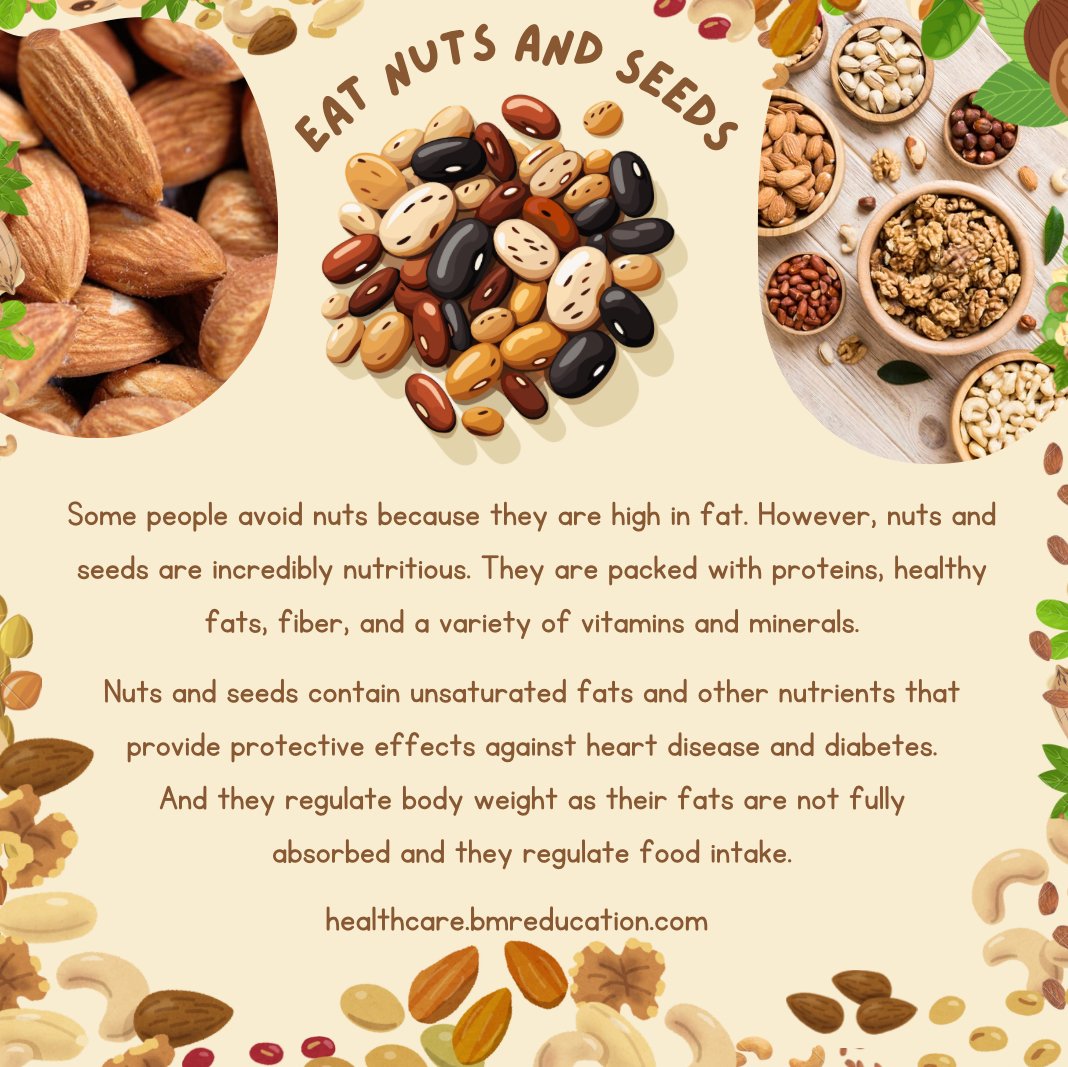Eat Nuts and seeds: Nature's Perfect Packages of Health
Nuts and seeds are good sources of protein, healthy fats, fibres, vitamins and minerals. They contain unsaturated fats and other nutrients that provide protective effects against heart disease, diabetes and regulate body weight.

Some people avoid nuts because they are high in fat. However, nuts and seeds are incredibly nutritious. They are packed with proteins, healthy fats, fiber, and a variety of vitamins and minerals.
Nuts and seeds are nutrient-dense foods that offer numerous health benefits. Here are some tips on how to incorporate them into your diet for optimal health:
- Portion Control: While nuts and seeds are healthy, they are also high in calories. Stick to a small handful (about 1 ounce or 28 grams) per day to avoid excessive calorie intake.
- Variety: Eat a variety of nuts and seeds to get a broad spectrum of nutrients. Common choices include almonds, walnuts, cashews, pistachios, chia seeds, flaxseeds, sunflower seeds, and pumpkin seeds.
- Unsalted and Unroasted: Opt for raw or dry-roasted nuts and seeds without added salt or sugar to maximize health benefits and avoid unnecessary sodium and additives.
- Omega-3 Fatty Acids: Include nuts and seeds high in omega-3 fatty acids, such as walnuts, flaxseeds, and chia seeds, to support heart and brain health.
- Fiber Intake: Nuts and seeds are rich in dietary fiber, which aids digestion and helps maintain a healthy weight. For example, chia seeds and flaxseeds are particularly high in fiber.
- Protein Source: Use nuts and seeds as a plant-based protein source, especially if you follow a vegetarian or vegan diet. They can help meet your daily protein needs.
- Healthy Fats: The fats in nuts and seeds are predominantly unsaturated fats, which are beneficial for heart health. Replacing saturated fats (like those in red meat) with nuts and seeds can help reduce bad cholesterol levels.
- Antioxidants: Nuts and seeds are rich in antioxidants, such as vitamin E and selenium, which help combat oxidative stress and inflammation.
- Convenient Snacks: Keep a small bag of mixed nuts and seeds on hand for a convenient, healthy snack option when you’re on the go.
- Incorporate into Meals: Add nuts and seeds to salads, yogurt, oatmeal, smoothies, and baked goods to enhance the nutritional value of your meals.
- Storage: Store nuts and seeds in a cool, dark place, or keep them in the refrigerator or freezer to prolong their shelf life and prevent them from becoming rancid.
- Allergies: Be mindful of nut and seed allergies, which can be severe. Always check for potential allergens when serving food to others.
By following these tips, you can enjoy the health benefits of nuts and seeds while maintaining a balanced diet.
Health Benefits of Nuts:
- Heart Health:
- Almonds: High in vitamin E and magnesium, which support heart health and reduce inflammation.
- Walnuts: Rich in omega-3 fatty acids, which can lower bad cholesterol levels and improve heart function.
- Pistachios: Help reduce LDL (bad) cholesterol and increase HDL (good) cholesterol.
- Weight Management:
- Despite their high calorie content, nuts can help with weight management due to their fiber, protein, and healthy fat content, which promote satiety.
- Diabetes Management:
- Nuts like almonds and walnuts can improve blood sugar control and insulin sensitivity due to their low glycemic index.
- Brain Health:
- Walnuts contain antioxidants and omega-3 fatty acids, which support cognitive function and may reduce the risk of neurodegenerative diseases.
- Antioxidant Properties:
- Many nuts, including almonds and hazelnuts, are high in antioxidants like vitamin E, which help combat oxidative stress.
Health Benefits of Seeds:
- Omega-3 Fatty Acids:
- Flaxseeds and chia seeds are excellent sources of alpha-linolenic acid (ALA), a type of omega-3 fatty acid that supports heart health and reduces inflammation.
- Digestive Health:
- Chia seeds and flaxseeds are high in dietary fiber, which aids digestion, prevents constipation, and promotes a healthy gut microbiome.
- Bone Health:
- Sesame seeds are rich in calcium, magnesium, and phosphorus, which are essential for maintaining strong bones.
- Antioxidants:
- Pumpkin seeds are packed with antioxidants like vitamin E and carotenoids, which help protect cells from damage.
- Immune Support:
- Sunflower seeds are high in vitamin E, selenium, and zinc, which support the immune system and help fight infections.
- Hormonal Balance:
- Flaxseeds contain lignans, which have phytoestrogenic properties that can help balance hormones, particularly in women.
Incorporating a variety of nuts and seeds into your diet can provide these benefits, contributing to overall health and well-being.


